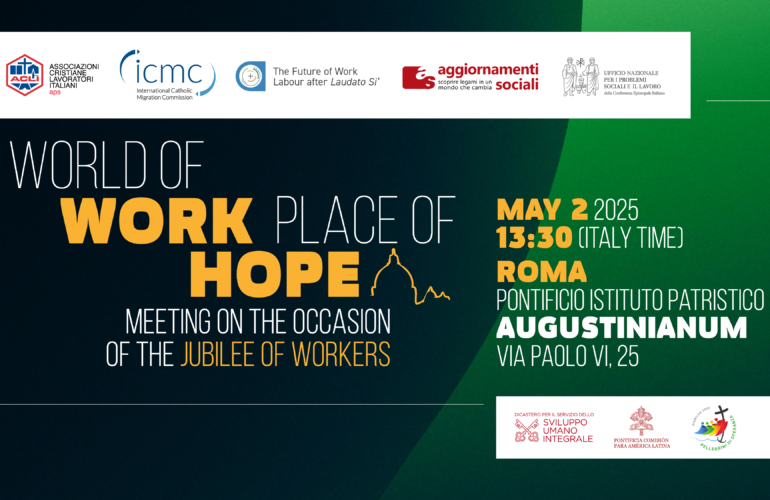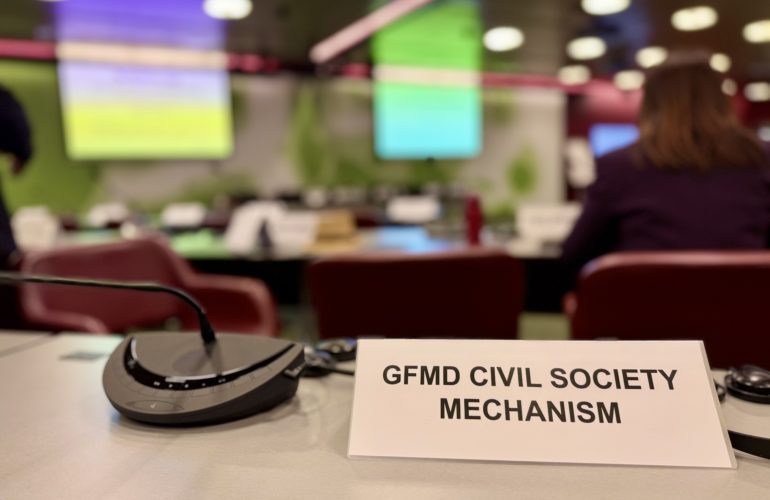Global Migration Summit Discussions Focus on Concrete Solutions to COVID Crisis
Hundreds of civil society organizations took part in this year’s discussions at the Global Forum on Migration and Development along with national governments and representatives of the private sector, cities and youth. The discussions concentrated on finding concrete ways to improve labor migration governance, migrants’ upskilling and the protection of migrants’ rights during the COVID-19 crisis while acknowledging that many of the gaps predated the pandemic.

The 13th Global Forum on Migration and Development (GFMD) Summit took place online from 18-26 January. It aimed to provide national and local governments, civil society organizations, and private sector and youth representatives with an informal venue to discuss migration-related issues, exchange good practices, and establish collaborations.
This year’s Summit focused on six themes: three directly related to labor migration, two touching on migrant protection and irregular migration, and the last one focusing on partnerships and best practices, the trademark of the GFMD.
Since 2001, the International Catholic Migration Commission (ICMC) coordinates civil society action at the GFMD. In this interview, Stéphane Jaquemet, Head of the GFMD Civil Society Coordinating Office and ICMC Director of Policy, discusses the event’s key takeaways as well as the challenges of holding an international gathering such as the GFMD Summit during a global pandemic.
[ICMC Communications] This year’s Summit was remote due to the COVID-19 pandemic. Did that affect the discussions?
[Stéphane Jaquemet] Initially, we worried that governments and other stakeholders would be more reserved during an online Summit, but in fact, the opposite was true. The United Arab Emirates, the Chair of this year’s GFMD, and all the participants were very engaged, thus managing to create a real dialogue. It was a pleasant surprise to see how stakeholders adjusted to the new reality.
Among the Summit themes, the governance of labor migration was one of the most prominent. Can you tell us about the outcomes of that discussion?
Labor migration was discussed in the light of the new reality brought about by the COVID-19 pandemic. Due to its outbreak, millions of migrants have lost their jobs and millions have had to return to their country of origin under extremely precarious circumstances. Most of them will probably never be able to get a similar job again. Some are profoundly indebted and are now unable to provide for their families. Much of the lost income had been used to put children through school and provide families with food, health care and other basic necessities.
In this context, it was encouraging to see some governments committed to inclusive measures that prevent discrimination against migrants in the implementation of recovery measures. Of course, to what extent they will enforce these measures remains to be seen.
One central message of the discussions is that we need to address several major shortcomings regarding labor migration. These include exploitation in the workplace, dependency on temporary jobs, migrant workers’ lack of access to essential services, and limitations in terms of joining trade unions. As we deal with the consequences of COVID-19, we cannot rebuild what was broken in the system by reproducing how it was before the pandemic.
Today, we are in the middle of an economic depression that has a huge impact on migrants. Regardless of some governments’ good will, recovery measures may initially help only a limited number of people. Some migrants may find a new job, but others will never recover. Millions of people will be left behind.
Do you think that governments are willing to acknowledge the failures of the past system and not repeat them as we rebuild the economy?
Yes and no! Some governments seem to understand that a number of things went wrong in the past and that they have to address them. However, how this understanding will turn into policies remains to be seen. Unfortunately, other governments will keep on implementing the wrong policies, affecting both migrants and their own economies.
For example, everyone says that COVID-19 has helped us realize that we are heading for disaster in terms of our impact on climate, that we need not repeat past mistakes, and that we should invest in green economies. These are great statements, but how will governments act when confronted with the need to rebuild the economy? Once you start recovering, it is always easiest to do what you have always done, follow old habits and traditional ways of functioning, or give in to pressures by unethical or self-centered economic actors.
The same is true when it comes to establishing systems that are inclusive of migrants, regularizing them rather than relying on underpaid irregular migrants, and providing access to services to everyone, regardless of their status.
Rebuilding the economy hinges on the role of private companies. How do you think private sector representatives feel about adopting change as we rebuild after COVID-19?
We need to make some distinctions when we talk about the private sector. All the business representatives I met at the Summit believe in ethical recruitment. They favor regular migration, decent work, and contracts and insurance for workers. This is an indispensable first step; it is the reason the Forum exists, that is, to build partnerships and alliances that allow us to jointly advocate for better standards.
The problem is that in the world beyond the GFMD, there are many actors who don’t necessarily share our values and practices. As we broaden our alliances, we may inadvertantly acquire unethical partners who can spoil our best intentions. We need to be realistic about our expectations. The GFMD can’t entirely eliminate the dysfunctions, shortcomings, and violations on the ground, but GFMD actors have a role to play to improve the situation.
The COVID-19 crisis risks widening the gap between developing and developed countries. Remittances from the diaspora are dropping, and many developing countries don’t have resources to implement measures similar to those adopted by developed countries to support their economies. Have there been discussions on mitigating the effects of increased inequality between States?
Yes. For example, there were discussions about ensuring that developing countries have equal access to COVID-19 vaccines. Civil society and international organizations like the International Organization for Migration and the UN Refugee Agency called upon governments for a fair distribution of vaccines. Some developed countries’ governments have expressed their support of this goal, including through financial aid. It’s a start. But developing countries are still a long way from equal access to vaccines.
Governments also made concrete proposals to respond to the growing economic gap between developing and developed countries. A few Western countries have put additional money aside to fund the COVID-19 response in partner developing countries. At the same time, some Western countries reduced their cooperation budget to provide unemployment benefits and other measures at home. And the decline in the global economy will certainly lead to decreased international assistance to the most vulnerable countries.
The GFMD discussions reflected that. We were discussing a mega-crisis and how we should progress as we exit it, but that’s not for today. We can expect some improvements in 2022-2023 but we’ll have to wait for 2025 or 2030 before we can talk about recovery.
The Summit also focused on irregular migration. Can you tell us about those discussions?
The issue of irregular migration shows the importance of a platform like the GFMD. When it was created 14 years ago, some governments didn’t want to discuss migration in a formal setting, particularly not at the United Nations. So the GFMD offered an informal platform where they could feel comfortable discussing complicated and politically sensitive issues, of which irregular migration is one.
This year, the access of migrants to services such as health care and education regardless of their status, the creation of “firewalls” that protect irregular migrants from arrest or deportation if they use those services, and the issue of forced returns were among the most controversial topics.
Although many governments remain quite skeptical, an increasing number of them now recognize that migration governance is not about restricting access to services, arresting irregular migrants, and deporting them. It is also about creating possibilities for people to migrate through regular pathways.
Several governments made good statements. Of course, the pandemic and the deep economic crisis will limit how far they will go in creating new opportunities, but I see a change in some governments’ rhetoric.
Gaps in protection, situations in which people cannot fully access their human rights, were another of the Summit’s themes. Can you tell us about those discussions?
Irregular migrants are often those who suffer the most from gaps in protection. Paradoxically, the COVID-19 crisis has created an environment where some countries are willing to be more forward-looking in this regard. They realize that some ways of the past have not been successful. We don’t know how that will translate into policies in the coming months and years, but it is an important achievement for this GFMD.
Partnerships between different types of actors are always central to GFMD discussions. Was it also the case at this year’s Summit?
Yes. There was broad consensus that partnerships are at the core of the GFMD’s identity. We are talking about working together to improve migration management and migrants’ lives. In that context, civil society would like partnerships to involve collective responsibility and a certain form of accountability. It is uncertain whether many governments will be on board with a more ambitious approach to partnerships, but an increasing number of partners, including governments, acknowledge the need for transparency.
Dilip Ratha, the World Bank’s thematic expert, pointed out that we can’t talk about partnerships without talking about money to fund them. So, he called upon governments to commit to such funding. And William Gois, the regional coordinator of the Migrant Forum in Asia, who served as the civil society focal point on labor migration, gave some good examples of partnerships between different stakeholders. So did participants in a roundtable on fostering partnerships to achieve migration-related goals.
Can you talk about the Summit discussions of new technologies?
We can view technology as a two-edged sword. On the one hand, it can provide numerous advantages, such as reducing the cost of remittance transfers and international recruitment or facilitating migrants’ access to information and services. On the other hand, it can create two categories of migrants, those who have a strong understanding of technology… and the others.
Unskilled migrant workers may be able to use such basic tools as Whatsapp, but are often unable to fill out online applications to access work and social services. Without support from organizations and access to training and computers, technology will not help them.
We know that digital exclusion — which, because many things have gone online, has been exacerbated by the COVID-19 crisis — often follows the lines of other drivers of biases such as gender, nationality, and ethnicity. We need to make sure that the most vulnerable or discriminated against migrants are not harmed by their lack of access to technology.
Another aspect of new technologies that raises concern is the collection and storing of migrants’ personal and biometric data by online platforms. This data could be used by law enforcement agencies to track down, detain, or deport migrants. Predators can also mine this data to exploit them.
During the Summit’s Closing Ceremony, the United States government requested permission to make a statement. Can you tell us about that?
The United States, which had withdrawn from all international fora on migration in 2017, made a statement committing itself to reengaging in discussions on migration and to participating in international fora to find solutions to common migration challenges. We very much welcome this renewed engagement in cooperation.
What is your overall impression of this Summit?
I would like to underline the engagement of civil society representatives. People who have been active in the GFMD for years played a key role, but we were also able to reach out to new participants.
I was pleasantly surprised by how governments engaged during the Summit as compared to the regional consultations. A number of their statements went in the direction that civil society wanted to see them go. On other issues, there were differences of views, but also willingness to be transparent and engage in frank discussion.
The United Arab Emirates’ organization was impeccable at all levels, which involved a lot of work behind the scenes.
The atmosphere during the discussions was cordial. This allowed for a certain degree of socializing, something we did not expect from an online summit, and partly made up for the loss of corridor discussions.
All things considered, we achieved more than we expected.
How do you see the future of the GFMD?
I believe that the governments genuinely want the GFMD to continue. France has confirmed its interest in co-chairing from mid-2022 to the end of 2023, while the outgoing Chair and the Steering Group are committed to creating conditions for a smooth transition and hopefully the appointment of a new Chair as soon as possible. Having said that, the current absence of a Chair is a major handicap.
All stakeholders value the GFMD as a unique platform for dialogue on difficult issues. They appreciate having a space where people can speak their mind, afford to disagree, and try to understand each other.
So, as this year confirmed that all stakeholders value the GFMD and want it to continue, I’m hopeful!


